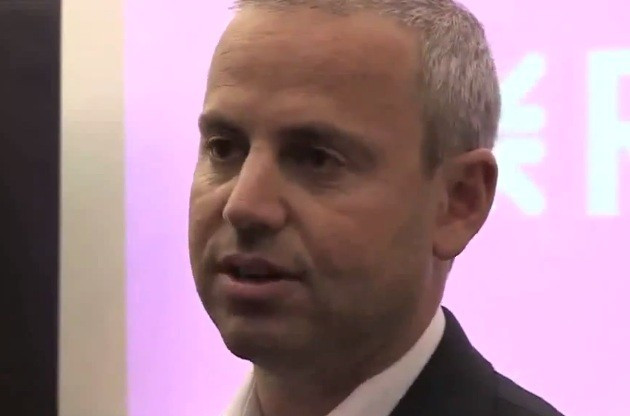Ocado Boss Tim Steiner's Orwellian Vision of Online Supermarket Shopping
Digital personal shoppers will know consumers' needs, quirks and budgets, Steiner tells British Retail consortium

Ocado's chief executive Tim Steiner painted an Orwellian picture of futuristic online grocery retailing in an industry speech, where all-knowing ultra-personalised systems cater to your every whim.
Delivering the British Retail Consortium's annual lecture, Steiner said online supermarkets such as Ocado are moving in a direction where they will know each individual consumer's dietary needs, health quirks, household budgets - even when friends are visiting and what they like to eat.
"They want us to tell them what they need. They want us to inspire them with what they might want to cook. They want us to offer them selection if they want to choose something different to what we've just put in front of them," said Steiner.
"That's a journey that starts with a digital catalogue. It moves through personalisation of the aisles. It moves on to different shops for each and every customer. It ends up in a very personalised conversation that we will have with our customers.
"Once they're reliant on us to choose their groceries for them each week, we hope that our services will be more meaningful to them than just how many products we sell and what price we have that week, which is where a lot of our competition has been today."
Steiner also said that robots will eventually pick out and pack products from Ocado's warehouses to then be delivered to the customer.
"In Hatfield, we have a robotics lab where we work with robots that would normally be welding and spraying cars. We're working on them picking six-packs of water or other items, so that we can over time become more and more efficient," he said.
Ocado has suffered three consecutive years of annual losses since its 2010 floating onto the stock market, though the amount of money slipping through its fingers has dwindled each year.
In 2012, Ocado narrowed its loss to £600k having generated £732m of sales in the year. This is down from 2011's loss of £2.4m.
In January, the former M&S chief executive Sir Stuart Rose joined Ocado as chairman.
Technology must be embraced
Online retailing is rapidly growing as more and more consumers choose shopping on the sofa over traveling into the physical stores.
Shoppers will spend £87bn online in 2013, according to a forecast in the IMRG Capgemini eRetail Sales Index. This is up 12% on the year before and a shot across the boughs to high street retailers that they must adapt to changing consumer habits or perish.
Mobile devices are at the fore of this sea change. In the same report, there was a staggering 304% year-on-year increase in sales from mobile devices.
"Technology is something that you absolutely have to embrace. It is probably the most critical part of your business today," said Steiner, who thinks in the not-too-distant future online grocery shopping will account for 50% of the market.
He added that some of Ocado's competitors are making "massive fundamental mistakes" as the cumbersome, bricks-and-mortar driven supermarkets trudge towards a new era in retailing.
"They're doing what grocery retailers and general merchandise retailers did in their stores 20 years ago," said Steiner.
"They're buying bits of packages: a package for mobile, a package for front end, a package for trolley picking, a package for routing. They're paying software people to lift the whole thing together, ending up with an enormous, unwieldy legacy system that makes change difficult.
"You need to have an integrated end-to-end system that you can change with a single vendor.
"You've got two options. Build one yourself, which we've spent thirteen years doing. Or buy one, which Morrisons did last week."
Morrisons signed a 25-year deal with Ocado to use its technology and systems so the established supermarket can finally enter the online grocery arena, a vacuum in its business threatening to swallow it.
"The agreement will enable Morrisons to enter the online grocery market quickly with a profitable business model," said Morrisons.
"This industry leading customer proposition combines Morrisons affordable fresh food - much of it from the Company's own manufacturing facilities - with Ocado's leading end-to-end technology, logistics and distribution operations."
The deal sent Ocado's share price soaring by as much as 50%, though it upset its other partner - high-end grocer Waitrose. The two have a contract due to expire in 2020, though there is a breakout clause set for 2017. Waitrose said it is consulting lawyers to see if there was any breach of contract in the Morrisons-Ocado deal.
"I actually do honestly believe [the Morrisons deal] is great for our supply partner Waitrose, because it will make us a stronger business that can invest more money in our platform and maintain - or even grow - our advantage over the competition," said Steiner.
Lower costs, cheaper prices
Steiner said an online revolution in grocery shopping will likely bring down the price of products as retailers' overheads are drastically reduced by a retreat from the need for physical stores.
"We're as competitive as the major players ... As we have taken out scale advantages and efficiency advantages, we've taken some of them for the business and some of them for the customer," said Steiner.
"If we carry on seeing the scale advantages and efficiency advantages we expect, if we give some of that back to the customer we're going to end up [cheaper] than the supermarkets.
"I think we'll see over the next couple of years we'll make more pricing moves to give more reassurance that we are as cheap as or cheaper than the supermarkets. Then, at some point, we'll just go right underneath."
He also said "location, location, location" used to be of central importance to grocers, but now this is being replaced by the convenience of delivery slots - from early in the morning to late at night.
© Copyright IBTimes 2025. All rights reserved.






















